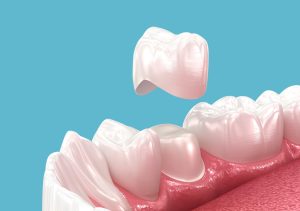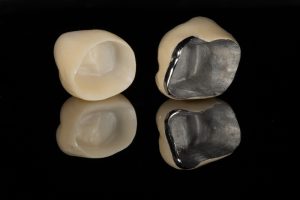Do You Need a Porcelain Dental Crown?
At DiBartola Dental, we understand that damaged, discolored, or misaligned teeth can impact both your confidence and oral health. Dental crowns, including classic porcelain dental crowns, have helped countless patients achieve the strong, beautiful smiles they deserve. Bridgeville restorative dentist, Dr. Wayne DiBartola brings years of experience in creating custom-fitted porcelain crowns that look and feel completely natural.
Ready to learn how porcelain crowns can transform your smile? Contact our Allegheny County dental practice at (412) 221-9440 to schedule your personal consultation with Dr. DiBartola.
What Are Porcelain Crowns?
Porcelain crowns are custom-crafted protective caps that completely cover the visible portion of a damaged tooth. At DiBartola Dental, we carefully design each crown to perfectly match the size, shape, and color of your natural teeth, ensuring seamless integration with your smile.
Our high-quality porcelain material mimics the translucent properties of natural tooth enamel, making it virtually impossible to distinguish from your real teeth. This is particularly important for visible teeth that show when you smile or speak.
Types of Porcelain Dental Crowns
At DiBartola Dental, we offer two primary types of porcelain crowns:
- Full Porcelain/Ceramic Crowns: These all-ceramic restorations provide the most natural-looking results and are ideal for patients with metal sensitivities. Dr. DiBartola often recommends these for front teeth where aesthetics are paramount.
- Porcelain-fused-to-metal (PFM) Crowns: These
dental crowns combine a durable metal foundation with an aesthetic porcelain exterior. While they offer exceptional strength, some patients may notice a slight dark line near the gum line. We typically suggest these for back teeth where durability is especially important.
Benefits of Porcelain Crowns
Our Bridgeville patients choose porcelain crowns for numerous reasons:
- Superior Durability: Modern porcelain crowns can withstand years of daily use while maintaining their beautiful appearance.
- Natural Aesthetics: Each dental crown is custom-crafted to match your natural teeth perfectly.
- Stain-Resistant Properties: Unlike natural teeth, porcelain resists coffee, wine, and other common staining agents.
- Versatile Solution: Whether you’re dealing with chips, cracks, severe discoloration, or misshaped teeth, porcelain crowns can address multiple concerns simultaneously.
Common Problems with Porcelain Dental Crowns
As your trusted Bridgeville dentist, Dr. DiBartola believes in full transparency about all treatment options. While porcelain dental crowns are a reliable solution for teeth restorations, they can sometimes experience problems such as the following:
- Investment: Quality porcelain crowns represent a higher initial cost compared to alternatives like composite fillings.
- Temperature Sensitivity: Some patients may experience temporary sensitivity to hot and cold.
- Maintenance Requirements: While extremely durable, porcelain crowns can chip under extreme force and may eventually need replacement.
- Chipping or Cracking: Porcelain crowns can chip or crack if subjected to excessive force or pressure. Avoid biting on hard objects and consider a nightguard if you grind your teeth.
- Discoloration: Over time, porcelain crowns can become discolored due to staining or wear and tear. Regular dental cleanings can help maintain their appearance.
- Loose Crowns: If the cement holding the crown in place becomes loose, the crown can become dislodged. Contact your dentist immediately if your crown feels loose.
- Tooth Decay: The tooth underneath the crown can still develop decay. Maintain good oral hygiene to prevent this issue.
- Gum Recession: If the gums around the crown recede, the crown may become exposed, leading to sensitivity or discomfort. Regular dental check-ups can help monitor and manage gum health.
The Porcelain Crown Process at DiBartola Dental
Consultation and Evaluation
Your journey begins with a thorough consultation with Dr. DiBartola. Using state-of-the-art imaging technology and his extensive experience, he’ll evaluate your teeth and discuss your specific goals to ensure porcelain crowns are your best solution.
Tooth Preparation
Dr. DiBartola takes a conservative approach to tooth preparation, preserving as much natural tooth structure as possible while ensuring your new dental crown will fit perfectly and last for years to come.
Impressions
We use precise digital imaging and traditional impression techniques to create an exact model of your teeth, ensuring your custom dental crown will fit perfectly and align properly with your bite.
Temporary Crown
While our trusted dental laboratory crafts your permanent dental crown, Dr. DiBartola will place a temporary crown designed to protect your tooth and maintain your comfort.
Crown Placement
Once your custom dental crown arrives, you’ll return to our Bridgeville office where Dr. DiBartola will carefully place and adjust your new crown, ensuring perfect fit and comfort.
Follow-Up
We’ll schedule a brief follow-up appointment to verify your crown’s fit and function, and address any questions or concerns you may have.
Caring for Your Porcelain Crown
To ensure the longevity of your porcelain crown, proper care is essential. Here are some tips to help you maintain your dental crown and keep your smile looking its best:
- Brush Regularly: Use a soft-bristled toothbrush and fluoride toothpaste to brush your teeth at least twice a day. This helps remove plaque and prevent tooth decay around the crown.
- Floss Daily: Flossing is crucial to remove food particles and plaque from between your teeth, including around the crown.
- Avoid Hard Objects: Chewing on hard objects like ice or hard candy can damage your crown. Be mindful of what you bite into.
- Prevent Grinding: If you grind or clench your teeth, consider wearing a nightguard to protect your crown from excessive wear and tear.
- Regular Dental Visits: Schedule regular check-ups and cleanings with your dentist to ensure your crown remains in good condition and to address any potential issues early on.
Porcelain Dental Crown Alternatives
The right choice of dental treatment will depend on your specific dental needs, aesthetic preferences, and budget. Here are some potential alternatives:
- Composite Resin: Composite is a tooth-colored filling material that can be used in certain situations instead of a crown. Composite fillings can restore a tooth that has a significant amount of structure missing, but they may not offer the same level of strength and durability as crowns. They’re often more affordable than a dental crown.
- Gold Crowns: Gold is one of the oldest materials used for dental crowns. It’s durable, non-abrasive, and requires less tooth reduction than porcelain or porcelain-fused-to-metal crowns. Some people prefer the appearance of gold, especially for back teeth, while others do not like the metallic look.
- Zirconia Crowns: Zirconia is a type of ceramic that’s known for its durability and strength. These crowns are tooth-colored and can be a good option for people who want both aesthetics and strength. They’re also metal-free, which can be advantageous for patients with metal allergies or sensitivities.
- CEREC® (Chairside Economical Restoration of Esthetic Ceramics) Crowns: This is a system that allows dentists to design, fabricate, and place a crown in just one visit. The crown is made from a block of ceramic material and is designed using computer-aided design/computer-aided manufacturing (CAD/CAM) technology. These are also known as same-day crowns.
- Onlays or Inlays: Rather than cover the entire tooth, onlays or inlays only replace a portion of the tooth. They can be made of porcelain, gold, or composite resin and might be suitable for teeth that don’t require full coverage but have too much damage for a simple filling.
- Dental Veneers: For front teeth that are mostly intact but have aesthetic issues, veneers can be a more conservative alternative. They’re thin porcelain shells that are bonded to the front surface of the teeth to improve their appearance.
Dental Insurance and Porcelain Crowns
Dental insurance can help cover the cost of dental crowns, but the extent of coverage varies depending on the insurance provider and policy. Here are some things to keep in mind:
- Check Your Policy: Review your dental insurance policy to see if it covers porcelain dental crowns and what the coverage limits are.
- Pre-Authorization: Some insurance providers may require pre-authorization before covering the cost of a dental crown. Make sure to get this approval to avoid unexpected expenses.
- Out-of-Pocket Costs: Depending on your insurance coverage, you may need to pay a portion of the crown’s cost out-of-pocket. Be prepared for this possibility.
- Network Providers: To ensure maximum coverage, visit a dentist who is part of your insurance network. This can help reduce your out-of-pocket expenses and streamline the claims process.
By understanding your insurance policy and working with your dental provider, you can make the most of your benefits and manage the cost of your dental crowns effectively.
Frequently Asked Questions
How long do porcelain crowns last?
With proper care and maintenance, porcelain crowns can last 10 to 20 years. However, their lifespan can vary depending on factors such as oral hygiene practices, diet, and the amount of wear and tear they experience. Porcelain crowns are known for their durability and longevity.
Are porcelain crowns expensive?
Porcelain crowns can be more expensive than other types of crowns and dental restorations due to the high-quality materials and custom crafting involved. The cost can vary depending on factors such as the complexity of the case, the number of crowns needed, and the geographic location of the dental practice.
Does getting a porcelain crown hurt?
Not at all. Your dentist will use a local anesthetic to numb the area and make the procedure as comfortable as possible. After the procedure, you may experience some sensitivity or soreness in the treated tooth, but this should subside within a few days.
Do porcelain crowns turn yellow?
Porcelain is highly resistant to staining and discoloration, and all-porcelain crowns made are designed to remain bright and white over time. To prevent discoloration, maintain good oral hygiene practices and avoid consuming these substances in excess. Additionally, regular dental cleanings can help remove any surface stains and keep your porcelain crowns looking their best.
Discover if Porcelain Crowns Are Right For You, Call Now!
Ready to transform your smile with a custom porcelain crown? DiBartola Dental proudly serves patients from Bridgeville, Scott Township, Carnegie, Heidelberg, Upper Saint Clair, and surrounding Pennsylvania communities. Call our Bridgeville office today at (412) 221-9440 to schedule your consultation with Dr. DiBartola and take the first step toward your restored smile.


 dental crowns combine a durable metal foundation with an aesthetic porcelain exterior. While they offer exceptional strength, some patients may notice a slight dark line near the gum line. We typically suggest these for back teeth where durability is especially important.
dental crowns combine a durable metal foundation with an aesthetic porcelain exterior. While they offer exceptional strength, some patients may notice a slight dark line near the gum line. We typically suggest these for back teeth where durability is especially important.

